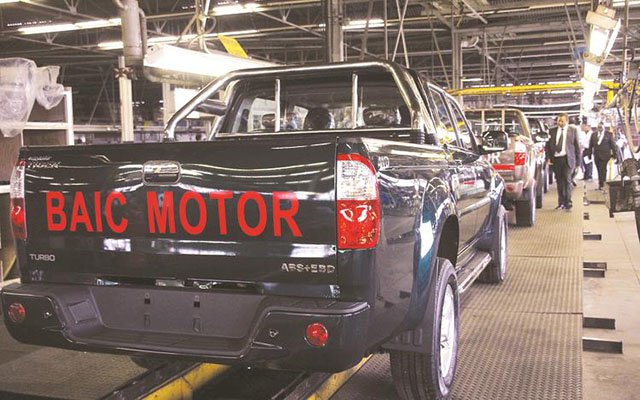EDITORIAL COMMENT: Resumption of operations at Willowvale a milestone


The new BAIC pick-ups assembled at the Willowvale Motor Industry during the launch in Harare on Monday
THE resumption of operations at Willowvale Motor Industries is a major milestone in Zimbabwe’s quest to revive its economy as well as create employment. WMI, which had been shut down for the past five years owing to operational constraints wrought by illegal sanctions imposed on the country by the West, has entered into a joint venture with a Chinese firm to assemble a new range of pick-up trucks from semi-knocked down kits.
The deal — a fulfillment of mega deals President Mugabe signed with his Chinese counterpart President Xi Jinping in August 2014, will see WMI assembling 3 000 units in three years, which will create 5 000 jobs and generate millions in taxes, with $1,3 million in Value Added Tax expected to be generated this year alone.
The partnership has resulted in the formation of Beiqi Zimbabwe, a joint venture between China’s fifth largest car manufacturer, the Beijing Automobile International Corporation (BAIC), WMI and Astol Motors.
The pick-ups that will be put together at WMI are called BAIC Great Tiger.
Beiqi Zimbabwe is responsible for procuring the semi knocked down kits from BAIC in China, while WMI will assemble the vehicles on a contract basis and Astol Motors, together with Amtec, will sell the vehicles and offer after service support.
WMI’s assembly plant had been under care and maintenance for the last five years and has now assumed the new role of a multi-contract assembler.
From the deal with BAIC, total sales volume is expected to be about 490 units this year, before rising to 940 units in 2018. Of the 3 000 units, which will comprise pick-ups, sedans and SUVs (to be launched later this year) 500 units will be exported to other Sadc countries. We hail the resumption of operations at WMI as it signals the success of Government’s Look East policy and further cements the already strong economic and political relations between Zimbabwe and China. We are excited by the prospects of a partnership between one of China’s biggest car manufacturers — BAIC and WMI as it puts the latter in a very strong position to reclaim its status as the country’s biggest vehicle assembly plant. We are equally impressed by the 5 000 jobs that will be created as a result of the deal as this fulfills one of the goals of the country’s much vaunted economic blueprint — the Zimbabwe Agenda for Sustainable Socio-Economic Transformation (Zim-Asset).
The partnership comes in the wake of ramped up efforts to revive the economy anchored on the success of the Command Agriculture scheme which has surpassed expectations. Beiqi Zimbabwe will also complement the operations of Quest Motor Corporation which is already manufacturing vehicles in partnership with Chinese companies at its Mutare plant. Quest already assembles and holds franchises for various Chinese models, including Chery Tiggo, JMC and Foton. It also holds the franchise for BMW and some Mitsubishi vehicles. It has recently started assembling the Chinese-built, Cummins-powered Tunland double cabs.
In addition to Cherry and Foton models, Quest also assembles Foton Daimler 3,5-tonne up to 30- tonne and tippers and the 8-tonne dropside body and 3,5 tonne trucks. The growth of the car assembly industry in Zimbabwe is a positive development for the economy as it means that there will be a drop in the flight of hard currency out of the country to purchase vehicles.
Zimbabwe ranks among the biggest markets for Japanese and British second hand vehicles and this has come at a huge cost to the economy as it means scarce resources are shipped overseas to procure cars. This has partly contributed to the cash crisis currently prevailing in the economy.
Officially launching the Bieqi Zimbabwe deal in Harare on Monday, Industry and Commerce Minister Mike Bimha said it was a clear indication of the excellent and cordial relations between Zimbabwe and China, and the kind of investment that the country was seeking.
“The investment has come at the most opportune time given that Willowvale Motor Industries had suspended production since September 2012,” he said.
“Today, the factory has been refurbished to some extent, but we hope our Chinese partners will transform it further into a state-of-the-art facility given the great strides they have made in technology advancement.
“I wish to applaud BAIC International Group for the milestone it has achieved so far which is evidenced by the semi-knocked down (sKD) kits that have been brought into the country to kick-start production.
“We would like to see a situation where Beiqi Zimbabwe moves from sKD production to completely-knocked down (cKD) production and possibly venture into local manufacturing of vehicle components.
“It is these kinds of partnerships that obtain across jurisdictions that Zimbabwe as a country is looking for. This enables the country not only to substitute imports, but generate the much needed foreign currency through exports and create employment.”
We agree with the Minister and urge banks to support the initiative by establishing retail financing structures at favourable terms, so as to stimulate demand and ensure growth of the sector.









Comments